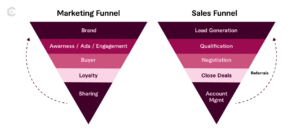Even savvy marketing pros can look at sales and marketing funnels through the same lens. However, understanding the differences can enhance your strategies to serve your customer’s needs.
We’ve put these two types of funnels head-to-head to help illustrate how they each can fit within your overall strategy.
Marketing Funnel vs. Sales Funnel: The Breakdown
Let’s break down the differences in each funnel by category.
Purpose of the Funnel
Marketing funnels take a long-term approach. It builds a relationship with the customer over time, taking them from initial brand awareness to loyalty and advocacy. Meanwhile, the sales funnel takes a short-term approach and focuses on what is needed to close the deal.
- Marketing Funnel
- Attracts and engages potential customers.
- Raises awareness about a product or service.
- Nurtures leads through various stages of the buying process.
- Sales Funnel
- Pinpoints individuals genuinely interested in a product or service.
- Provides direct response information and calls to action to purchase.
- Encourages repeat business through upselling or cross-selling.
Stages and Scope
The marketing funnel encompasses the entire customer journey, from the moment a person becomes aware of a product or service to the point of purchase. Meanwhile, the sales funnel focuses on generating revenue and maximizing the conversion rate at each stage of the process.
Activities and Tactics
While marketing funnel tactics focus on building initial interest and driving traffic toward sales, sales funnel tactics concentrate on personalized engagement and closing strategies to convert leads into customers.
- Marketing Funnels
- May include:
- Content marketing
- Social media engagement
- Email marketing
- Paid advertising
- SEO
- Webinars and workshops
- Customer testimonials
- Case studies
- May include:
- Sales Funnel
- May include:
- Lead scoring
- Personalized outreach
- Product demonstrations
- Proposal and negotiation
- Segmentation
- Closing techniques
- Sales presentations
- Customer loyalty programs
- May include:
Metrics
Marketing funnel metrics should aim to gauge the level of brand awareness and interest in your products and services, while sales metrics should evaluate how effectively you qualify, engage, and convert leads into customers.
- Marketing Funnel
- May include:
- Website Traffic
- Social media engagement
- Email open rates
- Click-through rates
- Page views
- Time on site
- Bounce rate
- Number of unique visitors
- May include:
- Sales Funnel
- May include:
- Lead-to-customer conversion rate
- Average deal size
- Sales funnel velocity
- Sales cycle length
- Customer acquisition cost (CAC)
- Customer lifetime value (CLV)
- May include:
Finding Your Funnel
Marketing and sales funnels are both used by businesses to turn prospects into customers. Still, they serve different purposes and target different stages of the customer journey.
The good news is that whichever one you choose, ClearVoice can help make it happen!
Connect with us today to start the conversation.




